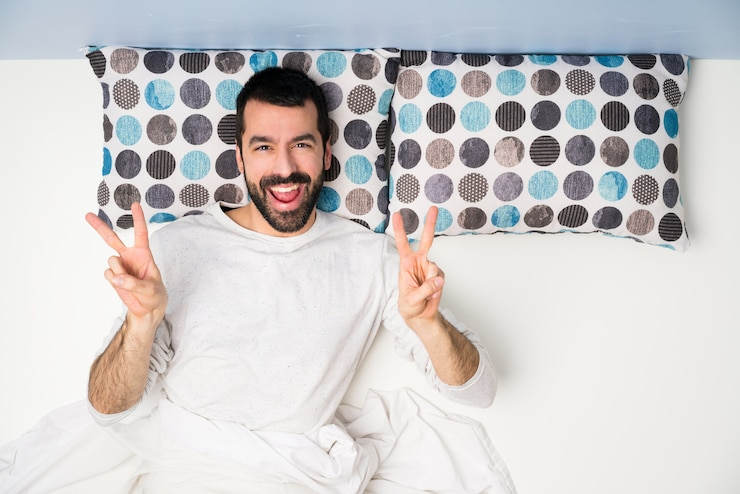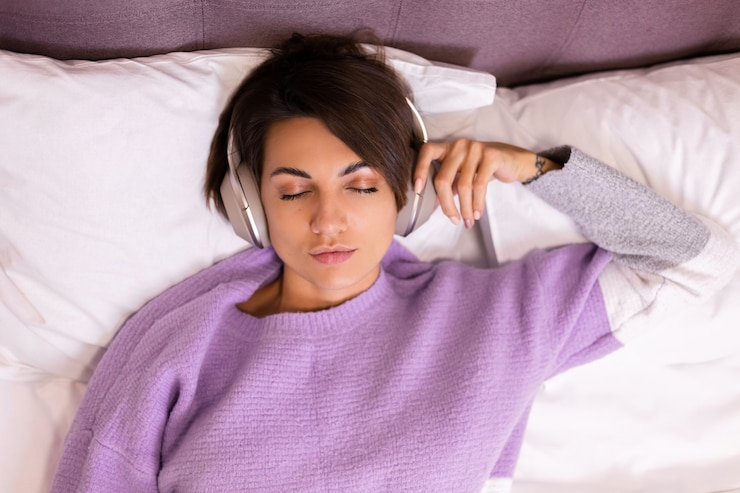Are you plagued by sleepless nights? Do you wake up feeling like you haven’t slept a wink, only to drag through your day, longing for just a sliver of shut-eye? These sleepless nights can wreak havoc on your mood, energy levels, and overall health. But fear not, there’s hope! This blog dives into the world of sleep hygiene, a science-backed approach to creating an environment that promotes quality sleep. We’ll explore strategies to combat those sleepless nights, from establishing a consistent sleep schedule to crafting a relaxing bedtime routine. By implementing these practices, you can transform your sleepless nights into restful slumber and wake up feeling refreshed and ready to conquer the day!
1. Exercise
Are you tossing and turning all night? Regular exercise might be the key to unlocking restful sleep. Engaging in moderate-intensity exercise for at least 30 minutes most days of the week can significantly improve your sleep quality. Exercise helps regulate your body’s natural sleep-wake cycle, making it easier to fall asleep and stay asleep throughout the night. It also promotes a healthy release of endorphins, which have mood-boosting and relaxation properties, further aiding in sleep. Just remember to avoid strenuous workouts too close to bedtime, as they can have the opposite effect. So, lace up your shoes, hit the gym, or take a brisk walk – your body and sleep will thank you for it!

2. Eat—but not too much
When it comes to sleep, a balanced approach to food is key. A growling stomach can definitely keep you awake, but overeating close to bedtime can also disrupt your sleep. Opt for a light, healthy dinner a few hours before hitting the hay. Complex carbohydrates, like whole grains or vegetables, provide sustained energy and prevent those late-night hunger pangs. Lean protein, such as grilled chicken or fish, can also help promote feelings of fullness. Avoid sugary or fatty foods, as they can trigger blood sugar spikes and lead to restless sleep. Remember, listen to your body’s cues – a small, pre-bed snack might be okay if you’re feeling truly hungry, but prioritize a light and nutritious meal for optimal sleep.

3. Avoid alcohol and caffeine
For a good night’s sleep, it’s wise to steer clear of alcohol and caffeine, especially in the hours leading up to bedtime. While alcohol may initially make you tired, it disrupts sleep cycles later in the night, leading to fragmented sleep and frequent awakenings. Caffeine, on the other hand, is a stimulant that can keep you wired and alert, making it difficult to fall asleep. The effects of caffeine can linger for several hours, so avoid caffeinated beverages like coffee, soda, and energy drinks in the afternoon and evening. Instead, opt for calming herbal teas or warm milk to promote relaxation before sleep.

4. De-stress
Calming your mind and body before bed is crucial for a good night’s sleep. Chronic stress can wreak havoc on your sleep quality, making it difficult to fall asleep and stay that way. To unwind and de-stress before bed:
- Incorporate relaxing activities into your evening routine.
- Take a warm bath, practice deep breathing exercises, or read a calming book.
- Avoid stimulating activities like watching TV or using electronic devices for at least an hour before bedtime. The blue light emitted from screens can suppress melatonin production, a hormone that regulates your sleep-wake cycle.
By creating a relaxing bedtime routine and quieting your mind, you’ll be well on your way to a night of restful sleep.

5. Better Mattress and Bedding
Invest in a sleep haven! Your mattress and bedding play a crucial role in achieving restful sleep. A supportive mattress that aligns your spine and minimizes pressure points can significantly improve your sleep comfort and reduce aches and pains. Consider factors like firmness level and material (innerspring, memory foam, etc.) to find the mattress that best suits your sleeping style and needs. Remember your bedding! Breathable, temperature-regulating sheets made from natural fibres like cotton or linen can help prevent night sweats and ensure a comfortable sleep temperature. Investing in a supportive mattress and comfortable bedding creates a sleep sanctuary that promotes relaxation and sets you up for a night of quality sleep.

6. Block Out Light
Darkness is your friend when it comes to restful sleep. Light disrupts the production of melatonin, a hormone that regulates your sleep-wake cycle. To create a sleep-inducing environment, consider blocking out light sources in your bedroom. Invest in blackout curtains or an eye mask to eliminate light from street lamps, electronics, or even a sliver of moonlight. Even a small amount of light can interfere with sleep, so ensuring complete darkness creates an ideal environment for your body to naturally wind down and drift into a deep, restorative sleep.

7. Minimize Noise
Peace are paramount for a good night’s sleep. Disruptive noises, whether it’s a noisy neighbour, a chatty pet, or even a rumbling air conditioner, can jolt you awake or prevent you from falling asleep in the first place. If eliminating the noise source isn’t an option, there are ways to create a quieter sleep environment. Consider using a fan or white noise machine to generate a constant, ambient sound that can mask disruptive noises. The steady hum can be surprisingly calming and lull you to sleep. Earplugs or noise-cancelling headphones are another effective options, physically blocking unwanted sounds from reaching your ears. By taking steps to minimize noise distractions, you can transform your bedroom into a tranquil haven conducive to restful sleep.

8. Get at Least Seven Hours of Sleep
Most adults underestimate the power of a consistent sleep schedule. Just like you wouldn’t skip a workout or a healthy meal, prioritizing sleep is essential for optimal physical and mental health. Aim for at least seven hours of sleep each night. This allows your body to repair itself, recharge your energy levels, and consolidate memories. A consistent sleep schedule further strengthens these benefits. Going to bed and waking up around the same time each day, even on weekends, regulates your body’s natural sleep-wake cycle. This makes it easier to fall asleep faster, sleep more soundly, and wake up feeling refreshed and ready to take on the day. So, prioritize those precious hours of shut-eye – your mind and body will thank you for it!

Finally, achieve deep, restful sleep naturally. Try Chronoboost pro tonight!
9. Keep a Sleep Diary
Unveiling the secrets to a better night’s sleep can feel like solving a mystery. To crack the code, consider keeping a sleep diary! This simple tool acts as a window into your sleep patterns. Each night, track details like the time you went to bed and woke up, how long it took to fall asleep, and the quality of your sleep (restful, restless, etc.). Additionally, jot down any factors that might influence your sleep, such as caffeine intake, exercise, or stressful events. Over time, you’ll start to identify patterns. That late-night coffee ritual is disrupting your sleep, or a relaxing bath before bed promotes better rest. By keeping a sleep diary, you gain valuable insights and can tailor your habits to promote restful sleep and wake up feeling re-energized.

10. Sleep hygiene
Achieving restful sleep doesn’t have to be a mystery. Sleep hygiene, a set of practices that promote quality sleep, is your key to unlocking a good night’s rest. This involves creating a sleep-conducive environment in your bedroom. Ensure darkness with blackout curtains or an eye mask, and minimize noise with earplugs, a white noise machine, or soundproofing techniques. Develop a relaxing bedtime routine that signals to your body it’s time to wind down. Take a warm bath, read a book, or practice deep breathing exercises. Your diet also plays a role – avoid heavy meals and sugary drinks close to bedtime, and opt for a light, healthy dinner. Establish a consistent sleep schedule, going to bed and waking up around the same time each day, even on weekends. Don’t forget the power of exercise! Regular physical activity promotes better sleep but avoids strenuous workouts too close to bedtime. By incorporating these sleep hygiene practices, you can create a sleep sanctuary that promotes relaxation, minimizes sleep disruptions, and sets you up for a night of deep, restorative sleep.

11. Set Your Alarm for the Same Time Each Day
Consistency is key when it comes to sleep hygiene and achieving restful nights. One way to regulate your body’s natural sleep-wake cycle is to set your alarm for the same time each day, even on weekends. This predictability helps your body establish a rhythm, making it easier to fall asleep faster and wake up feeling more refreshed. Sticking to a consistent sleep schedule, regardless of the day, allows your body to anticipate bedtime and prepare for sleep. You might even find you don’t need the alarm as often because your body will naturally wake up feeling energized at its usual time. So ditch the snooze button and embrace the power of consistency for a better night’s sleep.

12. Limit Nicotine Use and Smoke Exposure
Restful sleep and nicotine or secondhand smoke exposure don’t exactly go hand in hand. Nicotine acts as a stimulant, making it harder to fall asleep and stay asleep throughout the night. It can also increase awakenings during the night and fragment your sleep. Smoke exposure, both direct and secondhand, can irritate the airways and lead to coughing, further disrupting your slumber. If you’re looking to improve your sleep quality, consider limiting nicotine use, especially in the hours leading up to bedtime. Additionally, create a smoke-free environment in your bedroom to minimize any potential irritation from secondhand smoke and promote a more peaceful sleep experience.

13. Non sleep deep rest
Ever crave deep relaxation without actually falling asleep? Enter non sleep deep rest (NSDR), a practice gaining traction for its ability to induce a state similar to deep sleep, minus the slumber itself. Non Sleep Deep Rest techniques, like guided meditations or focused breathing exercises, help you achieve profound relaxation while remaining conscious. This can be beneficial for reducing stress and anxiety, improving cognitive function, and even boosting energy levels. Unlike meditation, which focuses on cultivating awareness of thoughts and emotions, Non Sleep Deep Rest aims to quiet the mind and promote a state of physical and mental calmness. Whether you’re looking for a quick pre-work stress buster or a way to unwind before bed, Non Sleep Deep Rest offers a unique approach to deep relaxation without needing to commit to a full night’s sleep.



